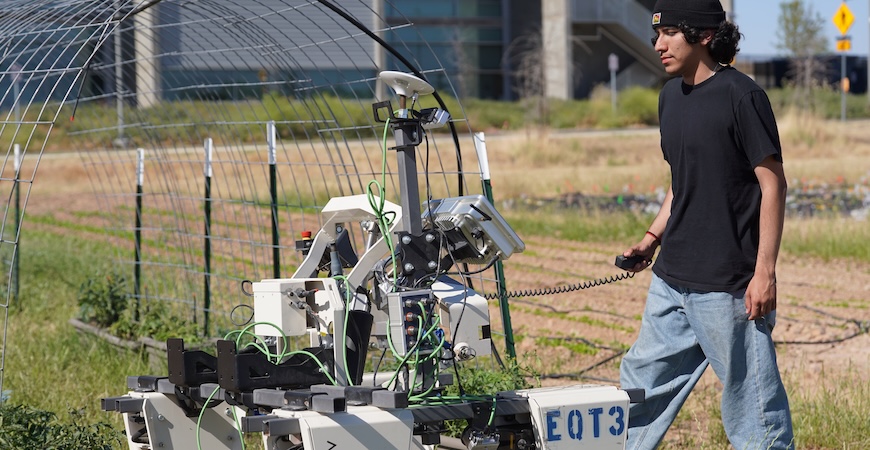
At UC Merced's biggest lab, students work from before sunrise to well after dusk. They are operating the university's Experimental Smart Farm, 40 acres of dirt and plants, research and experiments.
They study everything from pollinators to hydroponics, but there are more than just academic endeavors happening: Students say they have plans for community engagement opportunities including a corn maze and pumpkin patch. They also have been planting tomatoes, peppers, cucumbers, squash, kale, arugula and melons.
Agriculture technology has been a part of the UC Merced fabric since the university began, but in recent years it has moved front and center. An agricultural technology emphasis has been approved under the mechanical engineering major, and an Ag Tech Club was established on campus last year.
"We are very excited about the new ag tech emphasis for mechanical engineering and partnering with the Smart Farm to provide unique educational opportunities for the students in this program," said Professor Ashlie Martini, chair of the Department of Mechanical Engineering.
Jesse Martinez, a physics major from Los Angeles, said he got involved with farm operations early in his UC Merced academic career.
"I thought I was going to be working in a lab. And I did, with (life and environmental sciences Professor) Rebecca Ryals." But much of that work took place in the greenhouse or on — and in — the land. And since then, through his involvement with the Ag Tech Club, Martinez has taken part in several experiments that align with his major.
He shared his experience on a recent tour of the greenhouse and area around it.
"We've been working on nanotechnology and agrivoltaics," he said. "How we can store more energy."
He pointed out experiments that model bacteria growth to increase sustainability, and a two-way API, or application program interface, which enables two software systems to communicate and exchange data.
"We take in data from the soil and keep track of it," Martinez said. Smart irrigation systems tell users how long it's been since a crop has been watered as well as how much water to use.
Though much of the work at the farm is high tech, there are plenty of opportunities for hands-on work in the dirt as well.
"My favorite thing is to drive the tractor," Martinez said, laughing.
But not all the smart farm vehicles need a driver. Martinez demonstrated a robot that operates remotely. Plans call for the robot to learn to pick produce.
"It's going to fit into the trellis and pick berries automatically," Martinez said. That would mean the robot must learn colors, shapes and other aspects of each crop.
Another experiment aims to grow the plant from which rubber is extracted. Most of the rubber made in the world comes from plants grown in a small area of Southeast Asia.
"I'm very excited about that project as well," Martinez said.
Damian Eaton, a computer science and engineering major from El Segundo, said the farm is an opportunity to match his interest in robotics with a passion for agriculture. He has started a seed bank for native plants, including royal lupin found in the area.
"I went around campus to identify the native plants and collect them," he said. "I've got seedlings growing in my dorm room."
Other plans call for growing coffee and tea on the farm. And some projects don't involve soil at all.
Hydroponics is another area of experimentation. Ag Tech students are growing strawberries in a hydroponic system. That piqued the interest of Adamaris Alvarez, a spring 2025 graduate from Watsonville whose family has farmed the fruit for years.
"As soon as he mentioned strawberries, I said I know some people who would be interested," she said.
Though hydroponics might seem to use more water, an increasingly precious resource, it can be the case that it uses less.
"Hydroponics reduce the competitive nature of bacteria in soil," Martinez said. That makes for healthier plants. And the water can be recirculated and reused.
The students said they are excited to develop new technologies to serve agriculture in the heart of some of the finest growing areas in the world. And they can see the fruits of their labor — sometimes literally — go from a theory in a lab to a flourishing plant on the farm.
"It's busy out here," Martinez said. "Ag tech offers so many opportunities. We are cultivating a place where we can get more hands-on practice."